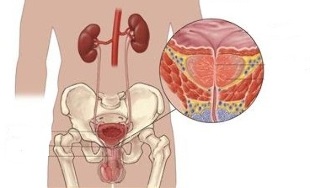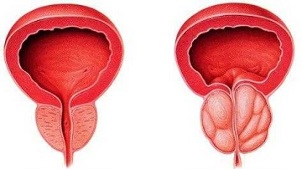The prostate gland, or as it is otherwise called the prostate, is a very vulnerable male organ that is exposed to various urological diseases, in particular prostatitis. And, despite the prevalence of the disease, treating chronic prostatitis is a rather difficult task.
Varieties of prostatitis and reasons for its development
Prostatitis is a disease of the prostate gland, accompanied by an inflammatory process of its tissues. Prostatitis is classified according to the following data:
- acute bacterial prostatitis caused by infectious agents;
- chronic bacterial (infectious) prostatitis;
- chronic abacterial (non-infectious) prostatitis;
- asymptomatic inflammatory prostatitis.
Chronic bacterial prostatitis - the nature of this species is not fully understood, despite many studies conducted. This type occurs in the male body as a result of prostate gland infection, which is possible for a number of reasons:

- severe hypothermia;
- problems emptying your bladder;
- unstable sex life (irregularity or lack thereof);
- chronic concomitant diseases of the genitourinary system;
- leading an unhealthy lifestyle;
- lack of mobility.
Most often the disease persists without obvious symptoms, becoming felt only during periods of deterioration, which are accompanied by signs such as:
- feeling of restlessness and incomplete emptying while urinating;
- decreased sexual activity;
- soreness in the lower abdomen.
Furthermore, chronic prostatitis can provoke various bladder diseases, being transferred to the stage of acute manifestation of the disease and then treatment of chronic prostatitis worsening is offered.
Chronic abacterial prostatitis - the incidence is 92-95% of all types of prostatitis, according to these data, the prevalence can be judged. This disease has no age limit, so it affects men of any age, but the peak falls on average at the age of thirty. The disease is diagnosed based on the following symptoms:
- presence of painful discomfort (more than 3 months) in the pelvic organs;
- has no signs of an infectious environment;
- Increased dysfunction of sexual activity and urination.
Chronic accountable prostatitis can also be distinguished in urology, which, in turn, is a consequence of chronic prostatitis and is more troubling for older men.
Can chronic prostatitis be cured?
Every patient is tortured by the question of the effectiveness of the treatment of chronic prostatitis, because this disease not only brings many concerns of a special specific nature, but also carries some psychological trauma for a man.
Considering the different guidelines in implementing the methods, we note that this appointment is made by a specialist based on diagnostic measures. The urologist individually designs a comprehensive prostate treatment program, which includes a whole range of therapeutic procedures. So a comprehensive conservative approach involves:
- drug treatment of chronic prostatitis;
- physiotherapy;
- manual therapy.
As noted, a specialist selects an individual program that is subject to adjustments from the general scheme, and each individual patient is a separate course of treatment for chronic prostatitis, calculated by his or her attending physician.
Effective treatment of chronic prostatitis mainly involves the following additional research:

- consultation of a neuropsychiatrist, endocrinologist, cardiologist;
- perform computed magnetic resonance imaging or brain imaging in order to examine its performance and structure functions;
- hormonal status research;
- Ultrasound of the genitourinary system.
How to treat chronic prostatitis if the patient does not see any symptoms? This case means that the patient is in remission or the disease is asymptomatic, the latter case, of course, involves an immediate visit to a specialist who will perform all the necessary procedures. Treatment conditions for chronic prostatitis usually vary from 2 weeks or more, this depends on the condition of the prostate and the extent of the disease.
For example, drugs for the treatment of chronic prostatitis require constant administration in men, who combine with the disease a decrease in arterial blood flow to the penis. And in order to increase this blood flow and cause an erection, a constant intake of vasodilator medication is required.
Treatment of chronic prostatitis at home
In case of exacerbation of chronic prostatitis, all the recommendations described below are followed. This is bed rest for a few days, exclusion of physical activity, refusal of alcohol. After removing the deterioration of chronic prostatitis, it is necessary to decide on your work and rest regime for many years.
To prevent recurring deteriorations, the following basic guidelines should be followed at all times:
- Avoid hypothermia - first of all, avoid landing on cold ground, concrete curbs, stones, even in the warm season. Dresses should be cheap, light enough, but appropriate for the season. A great way to get rid of chronic prostatitis exacerbations is to strengthen the body. In this case, you can use water hardening, air bath, being every day in the open air for at least 1-2 hours.
- it is very important to empty the bladder regularly, to avoid overfilling and prolonged holding of urine ("do not tolerate", go to the toilet every 3-4 hours).
- If you have a sedentary job, you should take a break for 3-5 minutes every hour or two and walk around, warming up. If this is not possible, you should perform at least 40-50 times anus pulls in one approach, repeating such exercises 4-6 times a day.
- Regular moderate physical activity is one of the most important factors in preventing exacerbations of chronic prostatitis by eliminating congestion in the prostate gland and pelvic organs. The minimum of such an activity are daily exercises in the morning, walking at a moderate or fast pace for 30-40 minutes continuously (i. e. , non-stop, going to the store, etc. ). In addition, you need a weekly outdoor trip with feasible work on site, berry picking, mushrooms or long walks on weekends for 2-3 hours, visiting the pool or, in extreme cases, exercising at home in the simulators. housework (treadmill, driving machine, stepper))
- If possible, rule out perineum trauma (refusal of regular professional cycling, equestrian sports, motocross).
- Regular sexual activity is the most important factor in eliminating prostate congestion. Moreover, moderation is important here, the correspondence of sexual relations with the sexual constitution of a man. It is important to avoid prolonged and interrupted sexual intercourse, to have a permanent sexual partner.
- Fight constipation.
- Complete refusal to drink alcohol during the period of deterioration of the prostate and the maximum reduction of the amount of alcohol consumed during the period of remission. This requires a complete rejection of cheap beer and wines.
- If possible, exclude work associated with constant nervous tension, frequent stressful situations, or even though you learn to resist stress through automatic training, meditation.
- Preventive visit to a urologist twice a year for clinical examination, TRUS, laboratory analysis of urine and prostate secretions, and after 40 years - and PSA. Implementing these simple measures will prevent possible exacerbations of chronic prostatitis, will help strengthen the body, protect it.
How to treat chronic prostatitis with medication?
The underlying causes of prostatitis are, first, various infections and sexually transmitted viruses, which in turn affect the urethra, being detected in the prostate tissue. It should be noted that when diagnosed with chronic bacterial prostatitis, treatment consists of several stages.
Treating bacterial prostatitis is one of the most difficult tasks of modern urology. Despite advances in diagnosis and early detection of the disease, only in 30% of cases a complete cure can be achieved. Modern therapy of bacterial prostatitis consists of several stages and can clearly answer the question: "Is chronic prostatitis treated and how exactly? " Success also depends largely on patient-physician chain coordination. So the main stages of treatment:
- pain relief - use of non-steroidal anti-inflammatory drugs;
- anxiety reduction - taking antidepressants;
- restoration of the urination process;
- local treatment - shower;
- physiotherapy treatment;
- targeted therapy - it is recommended to take medication prescribed by a doctor for chronic bacterial prostatitis, as well as antibiotics;
- Surgical treatment of chronic prostatitis - the use of this method is necessary in cases of narrowing of urethral and prostate abscesses.
It should be noted that nowadays the treatment of chronic prostatitis with antibiotics is quite justified, but only after the completion of the full course, which requires on average about 2 weeks. After graduation, which, the doctor evaluates the results, and most often has a positive trend. Antibiotics for chronic prostatitis are used because this disease is infectious, caused mainly by pathogenic bacteria, which unnecessarily requires antibiotic therapy. The key point is the correct choice of medication according to a clearly chosen scheme of use by the attending physician.
It should be especially emphasized that when taking medication for chronic prostate, you must strictly adhere to the time of the prescribed treatment regimen, as well as the frequency of dosing.
It is worth remembering that there is no absolute cure for the treatment of chronic prostatitis and maximum cure is possible only with a thorough diagnosis and compliance with all prescriptions of a specialist. Self-medication is particularly harmful for this disease, due to its specificity and seriousness.
























